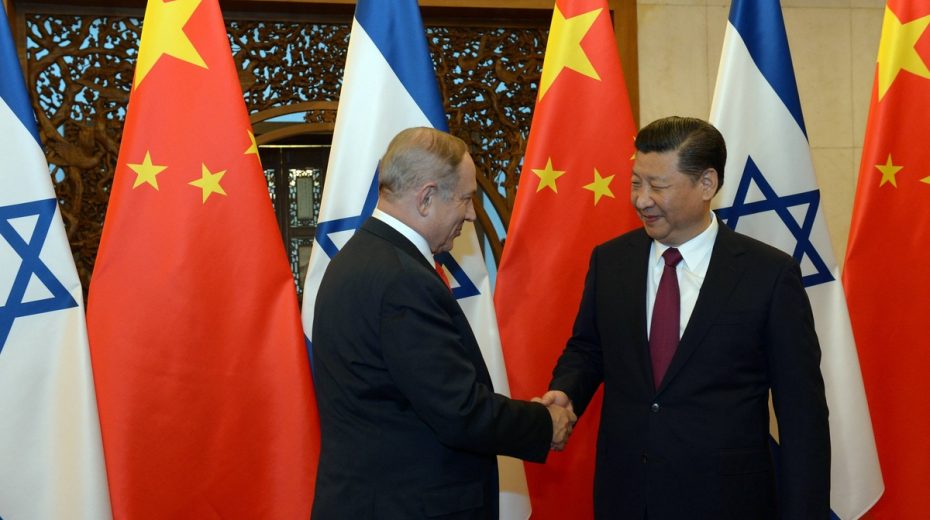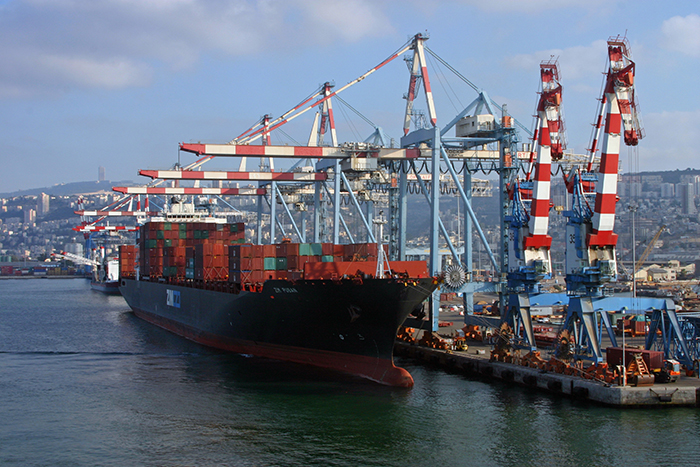ANALYSIS: The Advantages and Disadvantages of Israel’s Ties With China
 Israel-China relations flourished under Netanyahu, but that often rubbed Washington the wrong way
Israel-China relations flourished under Netanyahu, but that often rubbed Washington the wrong way
Relations between Israel and China date back to 1950, when the Jewish state was the first country in the Middle East to recognize the communist regime in Beijing.
However, relations remained on the back burner because China did not want diplomatic ties to Israel.
That changed in 1992 under the influence of the peace process with the Palestinian Arabs.
Since then, Israel and China have increasingly developed strategic, military, technological and economic relations.
Earlier in 1979, the Jewish businessman Saul Eisenberg had already organized a secret meeting between diplomats from China and Israel, but this did not lead to a breakthrough in relations.
The volume of trade between the two countries increased from $50 million in 1992 to more than $15 billion in 2013.
China is now Israel’s third-largest trading partner and export market, and this massive growth in economic relations has not been driven solely by the government. In the Jewish state, Israelis love to do personal imports and order clothes and many other products at Chinese online stores.
The State of Israel has also outsourced major infrastructure and other projects to Chinese companies. Examples are the light rail in Tel Aviv and the ports of Ashdod and Haifa, where a large new terminal was opened at the beginning of September. This state-of-the-art terminal allows the largest ships in the world to now dock in Haifa.

New Chinese operated port in Haifa
The terminal was built by the Chinese Shanghai International Port Group (SIPG) company, which owns this part of the port in Haifa. However, the staff is largely Israeli and so is the port’s management, while the contract with the Chinese company will be valid 25 years. In this way, China obtained another crucial hub in the world, this time in the Mediterranean.
Chinese companies invest in and even buy out Israeli companies, such as the dairy company Tnuva and ADAMA Agricultural Solutions.
Because Israel is an innovation center, most of China’s investments are focused on the Israeli technology sector.
This was a golden opportunity that China seized to modernize its fast-growing economy and its military.
Vital economic cooperation
An excellent example of Chinese capital helping to meet Israel’s needs while serving larger Chinese interests is Beijing’s involvement in the so-called “Red-Med” project, a 300-kilometer railway linking Ashkelon to the Red Sea.
The Israeli government, deeming “Red-Med” economically vital to the country’s future, responded enthusiastically to China’s offer to provide an experienced labor force and an investment of about $2 billion.
It is important to Israel that there will be an alternative to the Suez Canal in the event of a future war that would impede free shipping there.
From China’s perspective, “Red-Med” is just one node, albeit an important one.
China also wants to build a network of high-speed lines in Southeast Asia, Africa, and the Middle East, as well as in China itself. In this way, the country can come one step closer to superpower status.
Netanyahu’s role
Former Prime Minister Benjamin Netanyahu, in particular, was a proponent of expanding economic relations with China.
In just one visit to China during 2017, Netanyahu signed 10 bilateral trade agreements with the Chinese government.
As a result, in May 2019, China hosted a business conference in the Shandong Province, attended by more than 100 Israeli start-up companies as well as thousands of Chinese investors.
Ties between Israel and China expanded further during Netanyahu’s rule and now include academic, cultural exchanges, and booming tourism, that is to say until the Corona crisis erupted.
In January 2015, China and Israel further signed the China-Israel Innovation and Cooperative Action Plan.
Under this three-year plan, an alliance was formed between Chinese and Israeli universities to accelerate research and development cooperation. The Technion in Haifa, Shantou University, Tel Aviv University, Tsinghua University, and Haifa University collaborated during that time to establish laboratories and branches of Israeli universities in China.
So, tourism was also on the rise. In just three years, the number of Chinese visitors to Israel increased by nearly 300 percent, from 32,400 in 2014 to 123,900 in 2017. In addition, in 2018, Israel got permission to begin direct flights from Ben Gurion Airport to four different cities in China.
No diplomatic breakthroughs
But growing economic ties have not led to a much more Israel-friendly political change in the Chinese government.
Beijing, for example, is also currently expanding defense ties with Iran, Israel’s worst enemy. At the same time, Israel’s extensive defense ties with, and arms sales to India, a rival of China, also complicate the situation.
China also steadfastly opposes Israel in UN resolutions and refuses to allow Chinese workers to work in Jewish towns and cities in Judea and Samaria.
These are just a few examples of China’s conflicting geopolitical and economic interests.
American frustration
The deepening economic relationship between Israel and China is a thorn in the side of the United States and regularly leads to friction between Jerusalem and Washington.
There are certain security risks associated with increasing Chinese activity in Israel, the US government said. Those risks exist for both Israel and the United States, according to Washington.
Chinese activities in Israel could be dual-use. That means they can be used in business as well as have military applications. This is because many companies in China are state-owned or comply with the orders of the Beijing government. They could be forced to hand over sensitive information to the Chinese military, a development that the US government fears in particular.
America’s fears about Israel-China relations go back a few decades.
In the late 1990s, then-President Bill Clinton’s administration pressured Israel to cancel the sale of the Phalcon radar aircraft to China. The Phalcon is used for early warning against a hostile attack.
Similar pressure in 2004 forced Israel to cancel the sale of Harpy unmanned aerial vehicles (UAVs) to China. The Harpy UAV was developed by Israel Aerospace Industries and disrupts the air defense of the enemy.
The cancellation of the Harpy’s sale sparked a rift between Jerusalem and Beijing that lasted years before it was mended.
There are also security risks in the field of telecommunications.
Chinese company Huawei has already bought two Israeli companies and is now building 5G telecommunications infrastructure in Israel. Because this could give the Chinese company a gateway to valuable information, former US President Donald Trump warned that US-Israel ties could be damaged if Huawei carried out the project.
The current administration of President Joe Biden is also concerned about Israeli-Chinese cooperation, but Biden did not raise the issue during Prime Minister Naftali Bennett’s recent visit to the White House.
Lack of oversight?
While the US has established the Committee on Foreign Investment in the United States (CFIUS), Israel currently has no agency that can examine foreign investment in the country for potential security risks.
It is widely believed that Mossad, Israel’s foreign security agency, is investigating these risks.
A second concern is that the Chinese presence in Israel could be used for espionage. The new port of Haifa is a good example. The US Sixth Fleet and many Israeli submarines often dock here.
The Americans feared that if China started managing part of the port, it would install cameras and gain access to radio and mobile networks. Consequently, the Chinese could monitor US military activities and ship movements in the Mediterranean.
There were fears that the US Navy would now ignore Haifa, but those fears have proved unfounded so far.
All this places the military relationship between the US and Israel in a difficult situation.
While the decision to allow the Chinese presence in Haifa will boost Israel’s economic development, it shows that Israel is prioritizing growth over collective security with the US.
Israel is therefore walking the thin line in relations with the current and previous US governments.
On the one hand, the government in Jerusalem knows that American interests cannot be ignored in its relations with China. However, on the other hand, Israel also sees that the Middle East is undergoing significant changes and that the US is retiring as the dominant foreign power in the region.
China, Russia, Turkey, and Iran are filling the vacuum left by the US and this explains why Israel continues to strengthen its ties with Russia and China while opposing the rise of Turkey and Iran.

No comments:
Post a Comment